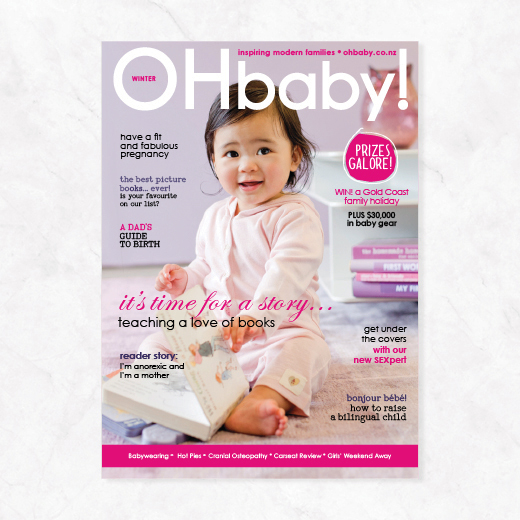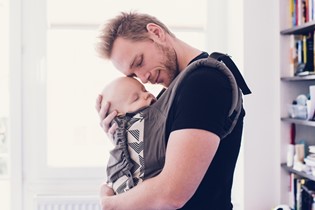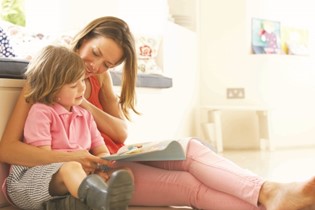Tips for looking after number one - you!

A happy parent creates a happy child, so try these helpful tips from Christchurch psychologist Dr Alice Boyes to help you flourish in your new role.
New parenthood is a time of great excitement, but also increased stress, as family dynamics change and parents learn to take on new roles and responsibilities. Taking good care of yourself during new parenthood doesn’t just benefit parents, it also benefits children. For example, a 2012 study in the prestigious science journal Developmental Psychology showed that fathers’ parenting stress and relationship satisfaction and mothers’ perceived social support were both related to how well children slept.
When parents use self-care it creates positive cycles where good parental control of emotions leads to the same in their children, which leads to easier parenting. As they say when you board a plane, you can best help your child if you put your own oxygen mask on first. Here are 13 tips on how to do that.
The only constant is change
Becoming a parent is one of life’s most significant transitions. Not only does it involve getting to know a new family member but it often triggers a multitude of other significant life changes. Exactly that changes vary from family to family, but they may include changes in employment or income, increased commitment between co-parents (for example, deciding to get married or live together due to the pregnancy), moving to a new home or neighbourhood, increased contact with extended family or changes in friendships and socialising.
Each change often has flow-on effects. For example, leaving your job involves losing one source of self-esteem and possibly a source of social contact. While becoming parents changes a couple’s relationship, if you are welcoming a second or subsequent child, there will inevitably be changes in your relationship with your existing children.
Transitions are inherently stressful. If you recognise all the changes that are happening at once, it will help you remember to give yourself kindness and have patience with yourself while you adjust. It can also be useful to remind yourself that people generally do adjust well to changes — adjusting to change is a human strength. Jot down a list of everything that is changing and give yourself the time and self-kindness to adjust to it.
A very common source of disappointment (and sometimes shame) is when a mother has planned to breastfeed but finds she needs to formula-feed. These types of situations are the perfect time to use self-kindness rather than self-criticism.
Self-criticism won’t make you the perfect parent
Most parents are highly motivated to do the best job they can. A very common psychological trap is for parents to react to any feelings of anxiety, sadness, guilt, disappointment, shame, anger or embarrassment by criticising themselves. People frequently have a subtle belief that criticising themselves will motivate them to make improvements in future behaviour. The research shows it doesn’t. Self-criticism is not an effective self-improvement strategy.
Anyone who has ever tried to self-criticise their way to dieting success will know that self-criticism doesn’t produce positive changes! In contrast, acknowledging your feelings and talking to yourself as kindly as you’d talk to a friend are much more likely to motivate you to consistently keep trying your best, even when your will power is depleted.
Throw out pre-conceived ideas
During the period of anticipation and build-up to a baby’s arrival, parents develop lots of pre-conceived ideas about how they will parent and what their child will be like. Parenting books that preach a particular philosophy of parenting often miss the point that there is no such thing as one-size-fits-all parenting. Good parenting depends on understanding your child’s temperament — for example, his optimal activity level, his sensitivity, how bold or cautious he is, how extroverted or introverted and how easily he copes with disruptions to routine.
Ditch social comparison
Since your child has his own unique temperament, comparing yourself and your child to others isn’t very useful. Temperament researchers sometimes classify children’s temperaments into three categories: easy, difficult and slow to warm. Parents of children with easy temperaments will have fewer parenting challenges than parents of children with the other two temperament types.
Socio-economic factors are important too. Research shows that parents with more resources and a smaller family are able to provide more personalised parenting to children with “difficult” temperaments, leading to these children growing up happier and better adjusted.
So this means if you are soldiering on without these benefits you could be doing fantastically well compared with a fellow mum with a similarly “difficult” child. So social comparison about how well your child is doing isn’t useful.
“Normal” is good enough
New parents might have a belief which goes something like, “We’re both smart and therefore our child’s development should be early.”
You need to notice if you are thinking something is wrong because your child is developing normally, but not early. Usually these types of worries are ultimately rooted in wanting the best for your child. However, having an attitude that “normal” isn’t good enough will increase your own stress and worry and put pressure on your child.
You are good enough
Many parents report a perpetual sense of not doing a good enough job. Often this nagging sense isn’t rooted in evidence, it’s just a general sense of anxiety. The secret to dealing with this type of thinking bias is to become mindful of when it’s happening. If you find yourself thinking “I’m not doing a good job” when objectively you are doing a good job, remind yourself that this is a common experience to have and be kind to yourself.
Sometimes mums and dads who feel anxious about parenting jump to the conclusion that feeling anxious means they’re not up to the challenge of parenting. However, anxiety is very often a false alarm.
Silence the tyranny of ‘shoulds’
Dr Amy Przeworski, a psychology researcher at Case Western Reserve University, who blogs about motherhood, says, “Parents have the idea that they can’t ask for help as it indicates that they are bad parents.”
Common “should” thoughts include:
- “I should be able to do this.”
- “I should be able to handle this on my own.”
- “I shouldn’t need anyone else’s help to take care of my infant.”
- “I should be able to find a way to comfort my infant.”
Dr Przeworski recalls her own example of the tyranny of shoulds: “My daughter was colicky and I can recall her screaming for hours each day. At times I felt that I would lose my mind if I had to listen to her scream for another minute. I was resistant to the idea of having a neighbour watch her because I saw that as an indication of my failure as a mother. In reality, being a mother is extremely difficult — you are taking on a new role, recovering from delivery, experiencing hormone shifts and attempting to learn the meaning behind your infant’s screams. But parenting takes a village. This is especially true if you are experiencing postpartum anxiety or depression or have a child who is colicky.”
This too shall pass
Notice when you’re over-generalising from current feelings to future feelings, such as, “I feel overwhelmed right now so I’m going to continue feeling overwhelmed.”
Another common cognitive bias is people expecting to feel the same way in the future (“I’m in love with this man now and I assume I’ll still be in love with him in the future”). When people have strong feelings, they have a hard time looking ahead and seeing that feelings naturally change. If you feel as if you can’t cope trust that those feelings will change.
Don’t take it to heart
Notice if you’re personalising other people’s comments, such as taking to heart and ruminating over a neighbour or in-law making a comment.
Yes, it takes a village to raise a child, but sometimes that village can be intrusive. Neighbours and in-laws are inclined to make all sorts of comments to new parents. These don’t necessarily mean they think you’re a bad parent, but it’s common for parents to jump to that conclusion. “Mindreading” what other people are thinking is just one of the common cognitive biases that people tend to do more of when they’re under more stress.
It can help to remind yourself that other people’s reactions to you are often more a reflection of their interaction style than they are reflections of you.
Slow it down
When parents feel stress they typically try to speed up, for example, tidying up during their child’s nap rather than using it as personal restorative time. Stress expert Toni Bernhard, who blogs for psychologytoday.com, recommends that when you feel stressed slow down whatever you’re doing by 25%. Whatever you’re doing, whether it be washing the dishes or reading your child a story, if you feel stressed, slow down your pace by 25% and feel your stress instantly reduce.
Live in the moment
Another great way to reduce your stress is to take very short mindful moments throughout the day. Do one slow breath and pay attention to the physical sensations of your body breathing for just one breath. Or, take a tiny moment to breathe in the smell of your favorite soap while you’re in the shower. Be in your own body by connecting to a sensory experience.
There is some emerging research showing that informal self-kindness practices may be as beneficial as formal meditation.
Create routines
Routines create a sense of stability, help regulate your daily and weekly rhythms, and reduce the burden of decision-making. For example, your child might go to a family member for babysitting once a week, you and an older child might make a weekly trip to the library or your family might have omelettes for dinner every Tuesday night.
Routines can help make sure each child in your family has regular special time with each parent. It can be as simple as an older child going for a walk to the dairy with Dad to buy milk each evening when Dad gets home from work. Choose routines that all the participants look forward to.
Calm yourself, calm your child
One of the theories of why parental self-regulation leads to more settled children is that parents play a vital role in helping their child regulate their biological rhythms. For example, a parent breathing slowly or singing softly while holding their child helps calm the child’s own physiology. When you’re particularly stressed, use physiological strategies to calm yourself and this will help your child become more settled as well.
For example, rolling up your sleeve and gently rubbing your own arm releases oxytocin and will instantly make you feel a bit calmer. If you have a partner, kissing for at least six seconds has positive mood benefits. Slowing your breathing will slow your heart rate and help you feel calmer. Taking a walk can also help regulate your physiology and that of your child.
Dr Alice Boyes has a PHD in psychology and her research about couples has been published in top international journals. In her spare time she watches much more reality TV than she’d like to admit.

AS FEATURED IN ISSUE 22 OF OHbaby! MAGAZINE. CHECK OUT OTHER ARTICLES IN THIS ISSUE BELOW

















